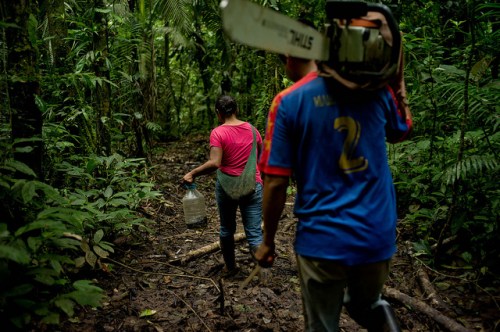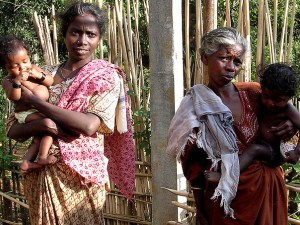An hour’s walk into the Amazon rainforest in Ecuador’s Orellana province, Maricela Tapuy and her sister-in-law are working alongside their husbands.
The family is clearing a patch of forest to plant crops: while the men topple trees with a chainsaw, the women slash saplings with machetes, and help to move the logs. Later, when the larger trunks are carved up by chainsaw for sale, they’ll help to stack the planks.
“When I’m not busy, I always go to the forest to help my husband,” Maricela says.
“If we hire someone else, we have to pay them. But if we women help out, we’ll have more money for the family.”
New research from the Centre for International Forestry Research (CIFOR) has found that Maricela’s situation is quite common among indigenous Kichwa women in Ecuador’s Amazon.
However, it’s something that’s rarely recognised by society and in policy, says Elena Mejia, a CIFOR researcher working on the Pro-Formal project in Ecuador , of which this gender study is a small part. Pro-Formal aims to shed light on Ecuador’s domestic timber market and the way in which smallholders engage in those markets; the gender study was carried out by Mejia and Liliana Vásquez, a student working with CIFOR on the project.
It tends to be assumed that timber harvesting and forest use in general is an exclusively male activity, as is common in mestizo communities in the same area, Mejia says. Earlier CIFOR research has found that very commonly in Latin American forest communities, it’s considered that “a woman’s place is not in the forest.”
But while mestizo women in the Ecuadorian Amazon stick to traditional reproductive and house-bound activities, Kichwa women nearby are starting to branch out.
I don’t like it in the forest: the sun burns your skin, there are insects – we suffer there so that we can get something to sell in town
The researchers surveyed around 20 Kichwa women in Orellana and Napo. In addition to interviews, they asked the women to complete a daily and monthly calendar of their activities.
“Because of the high cost of labour in Ecuador, men bring their wives and daughters to the forest to help cut down trees,” Mejia says.
“This development is important as it has broken down the tradition of the woman only staying in the house, the orchard and the field – now, she is also going to the forest.
”So men and women are sharing roles that before they didn’t share.”
However, she says, the research also found that selling timber remains a male-only activity; and that this hasn’t diminished the traditional female gender roles in these communities.
“Even though they are participating in the forest-based work, they still have to do the housework. So each woman is doing her housework, child-rearing, agricultural work – plus the work in the forest.”
It’s a small study, and further work is needed to test how widespread the phenomenon is. But these findings are important, says Mejia, to disprove the common myth that forest activities are purely masculine.
“This has political implications in that the government, in its publications and language about the forest, should recognise that gender is important, and that women are also involved in harvesting forest products – and at the moment this doesn’t happen.”
For Maricela at least, the work is out of necessity – something she endures to save enough money so that she can spend the weekends studying in Coca, the regional capital several hours away.
“I don’t like it in the forest: the sun burns your skin, there are insects – we suffer there so that we can get something to sell in town. With that money we can pay the transport to get to Coca each week,” she says.
Her dream is to get a job that no longer requires cutting down the forest.
“If you are a teacher, for example, you’re not suffering in the rain and in the sun, you’re just teaching classes to the children. So that’s why I decided to start studying,” she says.
“Then if we have other work, we can leave the forest for our children – one day they will need it, and will want to understand it – if there’s none left, what is there for them to understand?
For more information on issues discussed in this article, please contact Elena Mejia at k.mejia@cgiar.org
The Pro-Formal project (Policy and regulatory options to recognize and better integrate the domestic timber sector in tropical countries) is funded by the European Commission and forms part of the CGIAR Research Program on Forests, Trees and Agroforestry.
We want you to share Forests News content, which is licensed under Creative Commons Attribution-NonCommercial-ShareAlike 4.0 International (CC BY-NC-SA 4.0). This means you are free to redistribute our material for non-commercial purposes. All we ask is that you give Forests News appropriate credit and link to the original Forests News content, indicate if changes were made, and distribute your contributions under the same Creative Commons license. You must notify Forests News if you repost, reprint or reuse our materials by contacting forestsnews@cifor-icraf.org.


